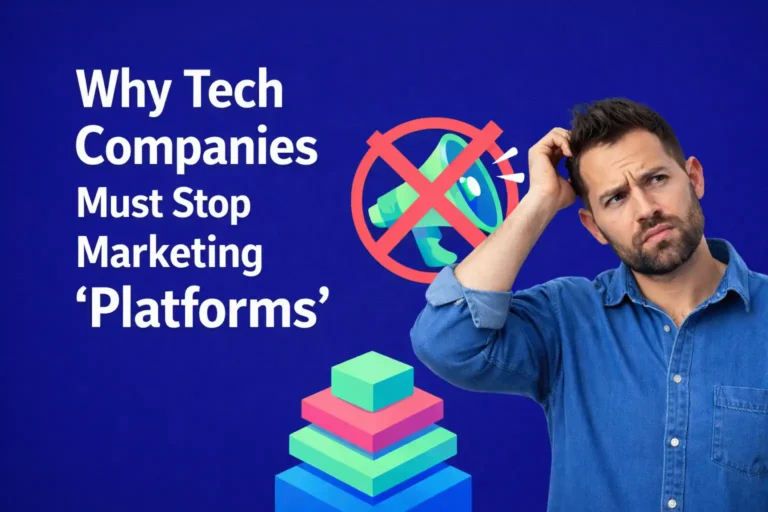New Startup…
During the initial stages of launching a startup, sufficient investment in marketing is required to establish a market presence and create awareness. Product-market fit is the focus, and marketing activity that directly translates into building revenue is a priority. The focus is on acquiring customers by establishing the business as a thought leader in its field and working with prospects that closely match your early-adopter characteristics. Customer advocacy and referrals are important, especially when great effort is dedicated to winning new clients in a bootstrap environment.

Early Growth Stage
Once you have established product-market fit, by winning your first customers who help validate your market, it’s time to start growing revenue. The early growth stage is the preparation that sets the foundation for scaling your business later. Consequently, marketing always needs to think ahead and plan. This phase of growth requires doing things more professionally and systematically, creating processes and workflows to support marketing and sales.
Based on what you learn in the early startup stage, you can now start targeting businesses more aggressively via multiple channels, selling to larger enterprises, developing partnerships, and, if appropriate, international brand awareness campaigns followed by geographical expansion. To support your growth objectives, resources will need to be made available for customer success and community building, both of which are likely to be necessary during scaleup. This stage requires a step increase in your marketing investment, if it is to be successful and lay the path forward for continued growth.
Scaleup Stage
This is where everything gets turned up to 11. All the lessons from the earlier stages must be used to refine, improve and prepare for wide market adoption. The go-to-market tactics must be manifested into scalable and repeatable processes. Gaining significant market traction is the focus, so sales teams and channels need to be primed to support a growing customer base.
Scaleup typically follows multiple funding rounds, providing the resources needed to drive growth. By this stage, some startups may already be generating substantial revenues and be able to fund their own expansion. However, many have yet to reach break-even. External funding can be essential because, even with strong market potential, a company may require additional support to get there. Growing a tech startup is costly, and for some, profitability may remain out of reach until they achieve scale, which is often only made possible through the backing of investors.
Maturity: Post-Scaleup Stage
It can be argued that the growth and development of a tech firm never stops, because any company worth its salt will be seeking perpetual performance improvements to report back to owners and investors. This is done through continuous innovation, product development and market expansion. However, the scaleup stage is when a tech firm experiences its most aggressive and exponential growth. The demands on the marketing function also mature and evolve in line with the different stages of growth, requiring more diversified activity.
International brand awareness campaigns may be necessary to maintain a strong presence, tailored to sustaining growth and retaining the recently expanded client base. Post-scaleup is where you will see a more pronounced shift away from a focused customer acquisition strategy to a more balanced split. This is because customer engagement strategies will now be a major part of marketing’s budget and activity. Sustained marketing investment will remain crucial for maintaining a leadership position in the market.
Marketing Spend After Scaleup
1. Gartner CMO Spend Survey:
Gartner’s research shows that high-growth companies (those growing at an annual rate of more than 10%) continue to allocate significant portions of their revenue to marketing, even after scaling up. Many high-growth businesses increase their marketing budgets as they grow, focusing on brand building, new market entry and customer retention.
2. McKinsey & Company Report:
McKinsey says companies that maintain or increase their marketing investment after achieving scale tend to perform better in terms of revenue growth and market share. Their research shows the importance of continued investment in marketing to drive sustained growth and prevent market stagnation.
3. Bain & Company Study:
Bain & Company highlights that companies in the scaleup phase often reallocate their marketing budgets rather than cutting them. They may reduce spending in some customer acquisition areas while increasing investment in brand building, global expansion and product marketing to support long-term growth.
Marketing Still Comes First
Successful tech firms generally do not pull back marketing investment after scaling the business. Instead, they adjust their strategies and reallocate resources to focus on sustaining growth, entering new markets and enhancing brand presence. Continued investment in marketing is crucial for long-term success, even after a company has achieved significant market share. This is the time when markets mature and competition is high, so maintaining a strong market presence is important.
The Pace of Growth
Translating your ambition into reality requires more than a groundbreaking product and a skilled team. To achieve substantial market share and sustained growth, you must invest strategically in both marketing and sales. The pace at which a B2B tech startup grows is a critical factor in its success. Rapid growth can help secure market leadership, attract investors and build a strong brand presence before competitors have had a chance to catch up. However, accelerating growth requires a coordinated and well-funded approach, with marketing playing a critical and central role.
Your Bridge to Success
Marketing is the engine that drives awareness, generates leads and builds brand credibility. As tech startups often operate in complex and competitive markets, the marketing team serves as the bridge between a great product and its potential customers. Without effective marketing, even the most innovative solutions can disappear into obscurity, failing to reach the decision-makers and influencers who would benefit from them. Marketing provides the direct route to achieving the commercial potential of your innovative tech solution.
You may want to read: “The Most Popular Marketing Tech for Startups.”






